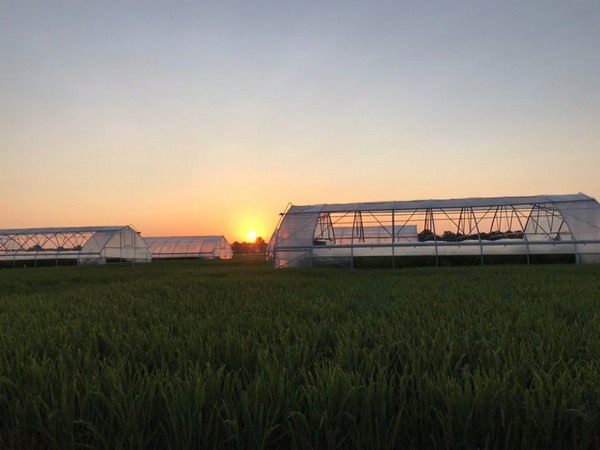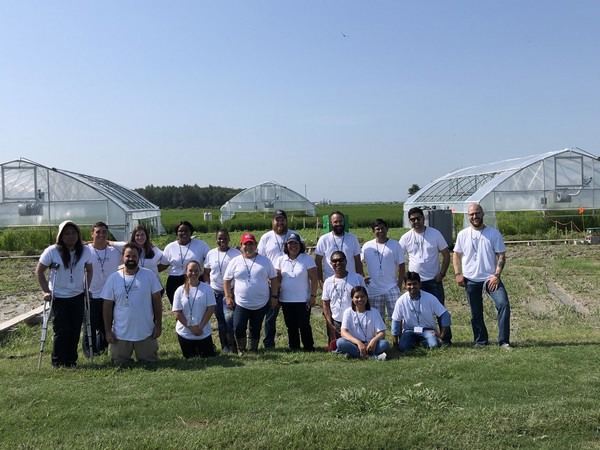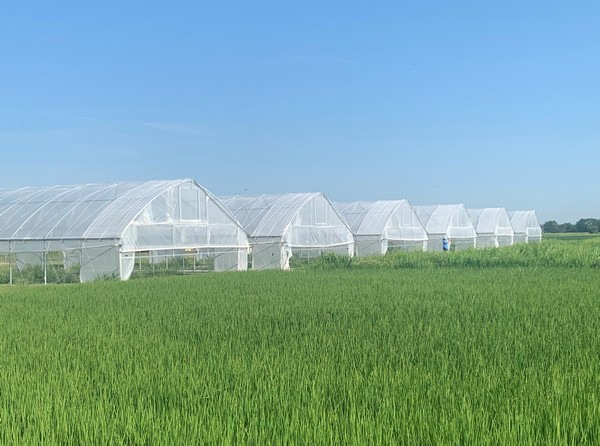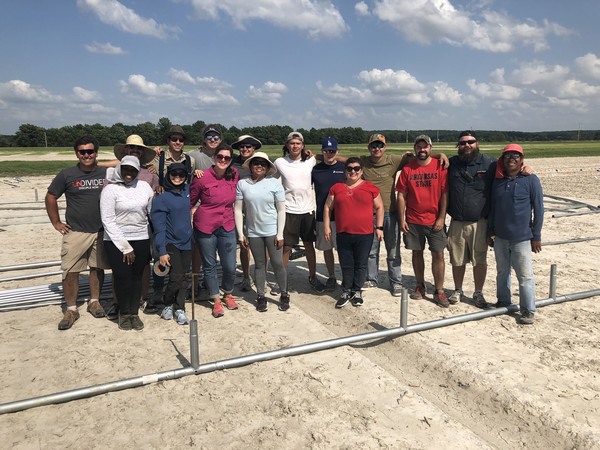It is no secret that heat stress can pose serious dangers to crops in summer. However, not only do the day temperatures influence plant growth but also night temperatures do. A widely grown crop like rice, for instance, loses 10% of its yield when the average night temperatures increase by only 1 Celsius degree.
To combat this, a team of researchers with Arkansas State University (A-State) has started a long-term research project in which the effects of night-time heat stress on rice flowers are measured. In order to create the right temperature, they built greenhouses with moveable plastic walls and roofs. “The research greenhouses enable us to study the plant growth and seed quality under various temperatures,” says one of the researchers, Argelia Lorence, James and Wanda Lee Vaughn Endowed Professor at A-State shares more about it.

The research greenhouses

“Arkansas is the biggest rice-growing state in the USA. Although the growers haven’t suffered from drought as much as growers in some other states, heat has been quite hard to deal with in the past years. That’s why we are hoping to find the genes that set apart heat-resistant varieties from others,” Argelia explains. Apart from yield loss, heat stress also causes what we call ‘chalkiness’ in rice, which causes white spots on the grain. The grains will break during processing, and the taste also changes. So the loss of seed quality is another negative consequence of heat. “Our long-term goal is to provide breeders with the information they will need to develop new rice varieties that companies and farmers can grow in warmer circumstances,” she adds.
Argelia expects that the outcomes of the research will benefit research into other crops too. “We expect to learn better how to find the relevant gene markers. That is why the WRCHR team is researching wheat as well. You read so much about heat stress everywhere, as it leads to yield losses in peppers, beans, soy, tomatoes, maize or almost any crop really. That’s why this type of research is so important.”

Research greenhouses
The six research greenhouses that the team uses are 30 ft wide, 48 ft long, and 15 ft high. In them, 30,000 rice plants are planted, 310 varieties from all over the world, plus 10hybrid varieties provided by RiceTec. Heat stress is only applied when the plants are flowering, as the flowers are most sensitive part of the plant to heat. In the first phase of the research, which we recently finished, we selected between 60 and 80 varieties that proved more tolerant to nightly heat stress. In the second phase, which we expect to take between two and three years in total, we will identify the relevant genes from the plants.
“For the second phase, we use a LemnaTec high throughput phenotyping robot to phenotype the rice seeds. We are using digital imaging to phenotype the relevant seeds.”


Using information from various sources
One of the strong aspects of the research is that it combines many different partners. Firstly, scientists work together with industry partners. RiceTec, a company located in Alvin, Texas, is the industry partner that has provided the team with an experimental station, land, water, materials, and machinery.
Secondly, all levels of academia are represented, from high school students, graduate students, Ph.D. students, junior researchers, and University staff. “Many of our students have grown up here, they grew up around rice fields, they care about rice, so we wanted to involve them too. Our research greenhouses arrived here in small pieces, like legos, and students also helped us set up the entire research.
The research is carried out in several locations. The Principal Investigator (PI) is Dr. Harkamal Walia, with the University of Nebraska Lincoln. The other PI’s are Dr. Krishna Jagadish, with Kansas State University, Dr. Hongfeng Yu with U Nebraska Lincoln, and Dr. Gota Morota with Virginia Tech University. Argelia herself represents A-State, and works closely together with Dr. Arlene Adviento-Borbe, who works for the USDA Delta Water Management Research Unit. Dr. Adviento-Borbe has many years of experience doing field research with rice and is an expert in greenhouse gas emissions. The parts and materials to build the research greenhouses were purchased from a Kansas entrepreneur, Greg Garbos, who found the company Four Seasons Tools.

“We would love to partner with more rice breeders and universities in order to transfer all our knowledge on new genes, new mechanisms, and new molecular markers, so more rice varieties can be bred. Since we are working with RiceTec, which has its own researchers and breeding department, I expect my dreams to come true in the coming years at least for Arkansas. In terms of more research, I hope to engage more researchers from all over the world. After all, crops are suffering from heat stress everywhere, but the struggles we encounter vary per region and per crop. Diverse teams are better problem solvers.”
For more information:
Arkensas State University
www.astate.edu
